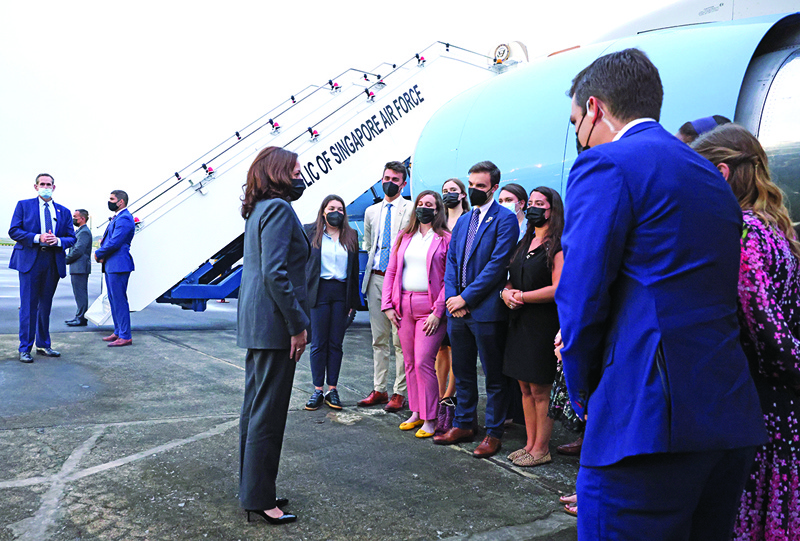 SINGAPORE: US Vice President Kamala Harris (center left) speaks with US personnel as she departs Singapore yesterday as she travels next to Vietnam. - AFP
SINGAPORE: US Vice President Kamala Harris (center left) speaks with US personnel as she departs Singapore yesterday as she travels next to Vietnam. - AFP
SINGAPORE: Vice President Kamala Harris accused China yesterday of intimidation in disputed Asian waters, seeking to rally regional allies as the United States' superpower status takes a hit over Afghanistan. Her comments in Singapore came as Washington seeks to reset relations in Asia after the turbulent Donald Trump era and build a bulwark against the rising might of Beijing. But her trip to the region, which also includes a stop in Vietnam, comes as Washington faces fresh questions over its dependability amid the US pullout from Afghanistan and Taleban takeover.
In a speech laying out her administration's foreign policy goals, Harris reiterated that Washington had "enduring commitments" in Asia-and took aim at China. "Beijing continues to coerce, to intimidate and to make claims to the vast majority of the South China Sea," she said. Meanwhile, Harris' flight from Singapore to Vietnam was delayed by three hours yesterday after an "anomalous health incident" took place in Hanoi, the US embassy said. Harris was due in Vietnam after a two-day stop in Singapore as part of a regional trip.
"The Vice President's travelling delegation was delayed from departing Singapore because the Vice President's office was made aware of a report of a recent possible anomalous health incident in Hanoi," the embassy statement said. "Beijing's actions continue to undermine the rules-based order and threaten the sovereignty of nations." But Beijing hit back, holding up the Afghan debacle as an example of the United States' "selfish" foreign policy, and accusing Washington of "bullying, hegemonic behavior".
"The current events in Afghanistan clearly tell us what the rules and order the US speaks of are," China's foreign ministry spokesman Wang Wenbin said. China claims almost all of the resource-rich South China Sea, through which trillions of dollars in shipping trade passes annually, with competing claims from four Southeast Asian states as well as Taiwan.
Beijing has been accused of deploying a range of military hardware including anti-ship and surface-to-air missiles there, and ignored a 2016 international tribunal decision that declared its historical claim over most of the waters to be without basis. Tensions have escalated recently between Beijing and rival claimants, with Manila angered after hundreds of Chinese boats were spotted at a contested reef while Malaysia scrambled jets to intercept Chinese military aircraft.
'Right, courageous'
Harris also sought to allay fears that growing US-China tensions could force countries that have strong ties with both of the world's top economies to choose sides. "Our engagement in Southeast Asia and the Indo-Pacific is not against any one country, nor is it designed to make anyone choose between countries," she said. Harris is the latest top official from President Joe Biden's administration to visit the region. On a trip to Singapore last month, Pentagon chief Lloyd Austin also strongly criticized China's maritime claims. But the Afghan crisis and doubts about US credibility are casting a long shadow over Harris's visit.
In yesterday's speech, she defended Biden's decision to push ahead with the US pullout from Afghanistan as "courageous and right" and reiterated US officials were "laser-focused" on the chaotic evacuation from Kabul airport. "The United States has been focused on safely evacuating American citizens, international partners, Afghans who worked side by side with us, and other Afghans at risk," she said. Harris also announced that Washington was offering to host the annual meetings of the Asia-Pacific Economic Cooperation (APEC) forum in 2023, a grouping that includes Beijing and the US.
The US-China relationship has deteriorated over a range of issues from cybersecurity and tech supremacy to human rights in Hong Kong and Xinjiang. Biden has largely continued Trump's hawkish stance on China, describing the Asian power as the pre-eminent challenge to the United States, but has lowered the temperature. The vice president also called for greater international cooperation to strengthen supply chains during talks with Singapore officials and business executives, as the US seeks to tackle a global microchip shortage. - AFP
.jpg)




